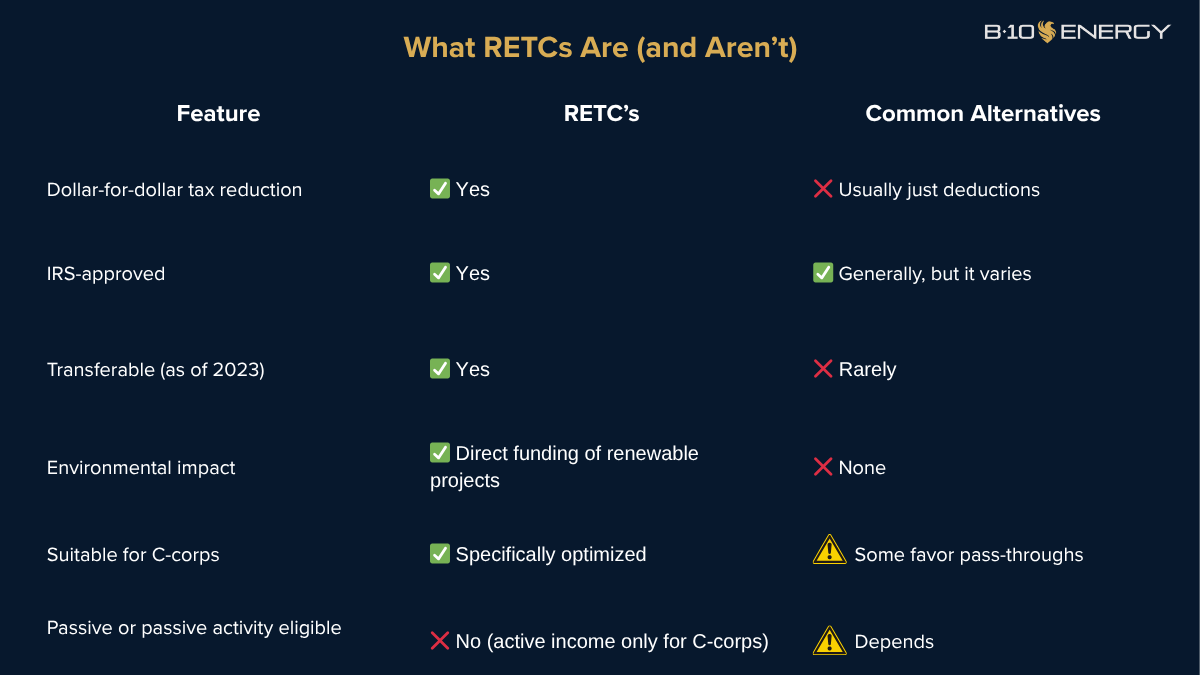
Yes, C-corporations can use Renewable Energy Tax Credits (RETCs) to reduce their federal tax liability — and often by up to 75% in a given year. These credits are transferable, meaning C-corps can purchase them without developing energy projects themselves. This blog outlines eligibility, mechanics, compliance, and how B10 Energy simplifies the process.
If you're a CFO, controller, or tax advisor for a C-corporation, you're likely on the lookout for strategic, IRS-compliant ways to reduce your company’s tax burden. One of the most powerful — yet still underutilized — tools available today is the Renewable Energy Tax Credit (RETC).
The short answer: Yes, C-corporations can absolutely use RETCs. And for many, they represent one of the smartest and cleanest tax planning opportunities on the table in 2025.
C-corps face a unique challenge: a fixed Federal corporate tax rate (currently 21%) and fewer tax reduction options than pass-through entities. As margins tighten and ESG expectations increase, C-corporations are looking for strategies that do more than just lower taxes — they need solutions that align with long-term value, stakeholder trust, and public accountability.
That’s where RETCs shine.
Thanks to updates from the Inflation Reduction Act, many energy credits are now transferable, opening the door for C-corps to purchase and apply them to their own tax liabilities — without needing to develop or operate a renewable energy project themselves.
RETCs can be used by taxpayers who meet the following criteria:
That last part is important: the IRS is increasingly focused on compliance in the credit transfer market. Working with a vetted credit provider like B10 Energy ensures that everything — from eligibility to documentation — is handled securely and correctly.
RETCs allow you to offset up to 75% of your federal income tax liability in a given year. That’s not a deduction — it’s a direct, dollar-for-dollar reduction in taxes owed.
For corporations with seven- or eight-figure liabilities, that’s a serious cash preservation tool.
Because the savings are realized as a credit (not a deferral or deduction), RETCs improve your actual after-tax earnings — a metric that’s meaningful to boards, shareholders, and performance-based bonus structures.
Unlike some advanced tax strategies that walk a fine line with the IRS, RETCs are clearly sanctioned in the tax code. When properly sourced and documented, they represent one of the lowest-risk, highest-impact strategies available.
At B10 Energy, we guide clients through a streamlined process to ensure their credits are sourced properly, documented fully, and applied efficiently. Here’s how it works:
We help you verify your entity type, income structure, and filing method to ensure you qualify under current IRS rules. (We also help clarify edge cases, like corporations with pass-through subsidiaries.)
Working alongside your internal team or CPA, we assess your annual tax liability and determine how much of that can be offset using RETCs — typically up to 75%. This step is critical to ensure you purchase only what you need and can use.
We connect you with verified, IRS-compliant renewable energy credits from eligible developers. These are thoroughly vetted for legitimacy, project certification, and transferability.
You’ll receive:
Beyond tax savings, RETCs help corporations tell a stronger story. We support your sustainability, ESG, and investor relations teams with clear data on the impact your credit purchase supports — from megawatts of clean power to carbon reduction equivalency.
The financial case for RETCs is strong, but the strategic upside goes further. Many companies today are under pressure to deliver on ESG commitments, and RETCs provide a clean, quantifiable way to do that.
Each credit purchased is tied to a real renewable energy project — solar, wind, geothermal, or other technologies. That means your dollars are directly funding cleaner power.
Transparent, measurable credit usage supports your CSR reporting, enhances your credibility with investors, and signals responsible corporate governance.
In short: RETCs offer a rare opportunity to meet your financial objectives while advancing corporate sustainability.
There’s often confusion around how energy credits work — and how they compare to other tax incentives. Let’s clarify:

Let’s bust a few myths that often stop companies from taking advantage:
C-corporations have a narrow set of truly effective tax tools that are both low-risk and high-impact. RETCs sit at the top of that list — offering predictable savings, measurable environmental benefit, and strong alignment with shareholder values.
The combination of:
…makes RETCs a strategic fit for many B10 clients, whether you're a CFO navigating tax exposure or a sustainability lead building your company’s impact profile.
C-corporations can absolutely use renewable energy tax credits — and with transferability in place, there’s no reason not to. You don’t need to be in the energy sector. You don’t need to manage a project. You just need to be smart about sourcing, compliant in application, and strategic in integration.
At B10 Energy, we help you do exactly that — from credit acquisition to IRS-ready documentation, all with a focus on simplicity and transparency.
Looking to reduce your corporate tax burden and fund verified clean energy projects? Contact us today to explore your options with Renewable Energy Tax Credits — and discover why more C-corps are making RETCs part of their financial and ESG strategy.
Insights into sophisticated tax benefits designed for high-net-worth individuals and businesses.